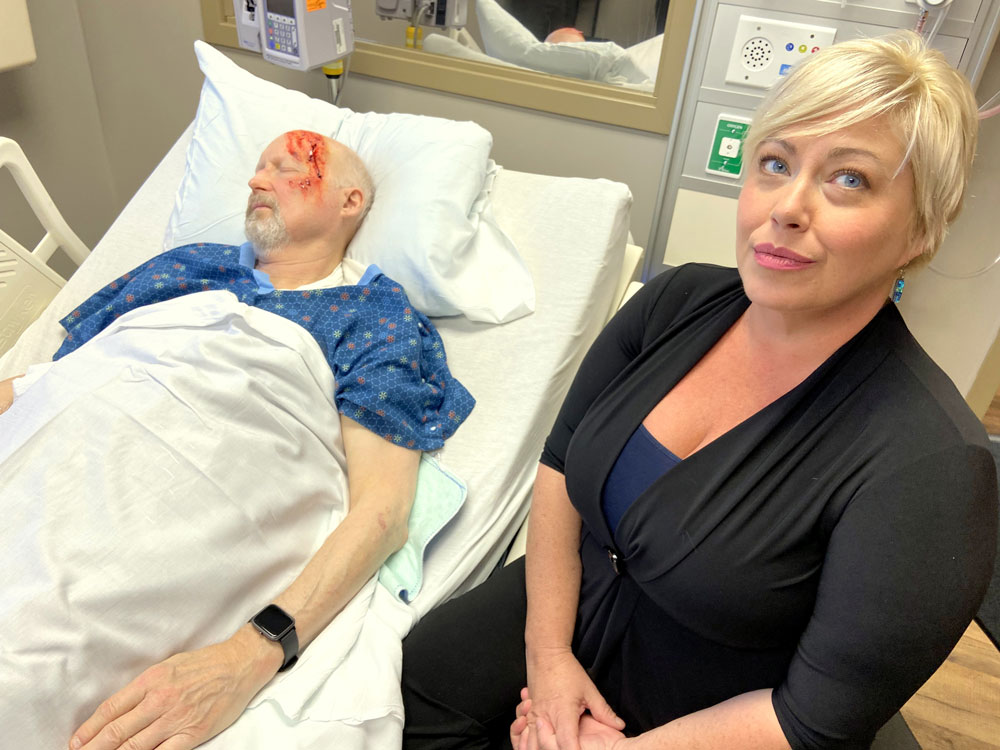
Actor April Whaley – a member of the Flagler Playhouse board and a performer with that troupe and Palm Coast’s City Repertory Theatre – has landed a lot of what she calls “intense” gigs in recent months.
The Flagler County resident and part-time accountant has portrayed a domestic abuse victim “with a black eye and severe anxiety,” a schizophrenic patient threatening her nurse, a hospital patient with “nine out of 10” pain, and a mother “freaking out” that her child has stopped breathing, she said.
But the stage for those Whaley performances wasn’t City Rep or the Flagler Playhouse. Rather it was one of the five classroom labs at the Regional Simulation Center at AdventHealth Palm Coast.
The $1 million facility, which was constructed in existing space in the hospital on State Road 100 and opened in late January, uses high-tech, interactive, realistic mannequins, flesh-and-blood actors, moulage (makeup) artists whose creations rival anything concocted by Hollywood splatter films, sophisticated computer equipment, and seasoned medical personnel to simulate a variety of health conditions and scenarios.
While the results, as revealed during a media tour on Wednesday, resemble a cross between Grand Guignol and “Blade Runner,” it’s all for the purpose of providing realistic training for AdventHealth nurses of all skill levels, as well as nursing students from the University of North Florida and Jacksonville University, the two schools that expanded to Palm Coast’s Town Center two years ago.
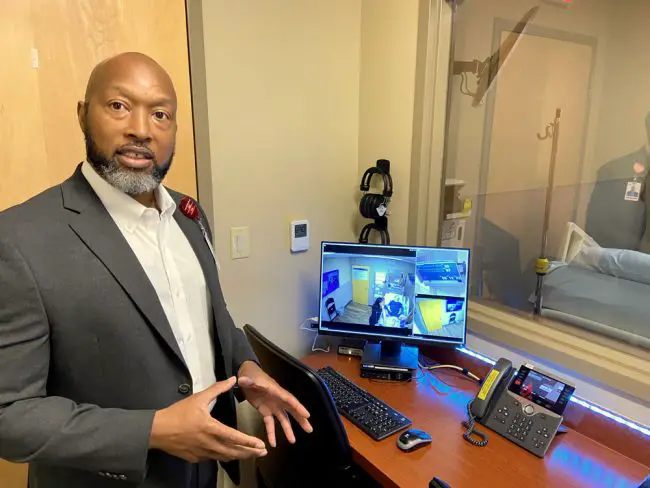
AdventHealth Regional Sim Center Manager Lee Wright said “simulation learning specialists” will work with healthcare professionals to create realistic scenarios and “to make sure we are meeting their training objectives. What are you trying to replicate inside the patient room that you might encounter (in real life), or what skill do you need to work on? They will work together and build their scenario” in one of the five sim labs.
Control stations with computers are set up outside each lab, “so that we control everything within the room as much as possible, like the vitals (of the mannequins) in order to meet the scenario requirements,” Wright said.
Mia Scarcella, one of three UNF nursing students training with a mannequin in a hip replacement scenario, said she and her colleagues had participated in “a hospice simulation, a total knee arthroplasty simulation, Parkinson’s, dementia, Alzheimer’s – we’ve done a lot of stuff.”
Other than getting a patient report right before stepping into a sim lab scenario, the nursing students do not know what health situation they will be confronting.
“We had a patient with PVD — peripheral vascular disease,” Scarcella said. “We get the report and it’s like ‘OK, this patient is going to have an amputation of their toes.’ So we pull back the sheet and it looked so real.”
“When I pulled back the sheets, I jumped — I literally jumped back,” said UNF nursing student Kylee McCurdy. “I was like ‘Wow, it’s real! They were missing toes!’ I didn’t expect it to be this real.”
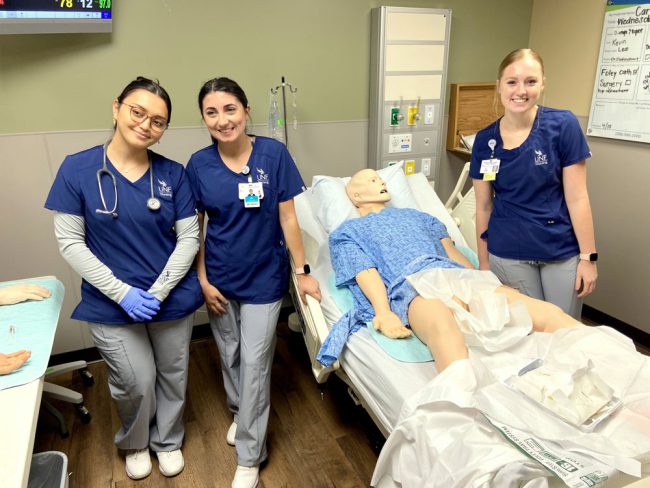
That simulation, carried out using a flesh-and-blood actor – who are called “standardized patients” in hospital simulation lingo — came courtesy of Chris Perrino, Scott Pantke and-or one of the other moulage artists, whose official title is O&S (Operation and Support) for Simulation.
“They will set it up so it looks 100 percent realistic based on the scenario,” Wright said.
The scenarios are “scripted,” he added. “We want to make sure the performance measures are captured and not just wing it.”
However, Whaley, the actor, noted there is plenty of “improv” involved for the performers, who must respond to the conversation or the reactions of the personnel or students undergoing the training.
“We do have basic scripts that have specific lines we have to say,” Whaley said. “But the students coming in don’t have scripts. You have no idea what they are going to say, so you have to respond to whatever they say. “So, it’s a fantastic improv practice,” she added, her inner actor coming out.
Whaley once portrayed a post-op patient “in a lot of pain, like nine out of 10 pain. That’s one of the more intense scenarios because it’s a 20-minute-long simulation where you are in intense pain and the nurses are not allowed to give you any more meds.
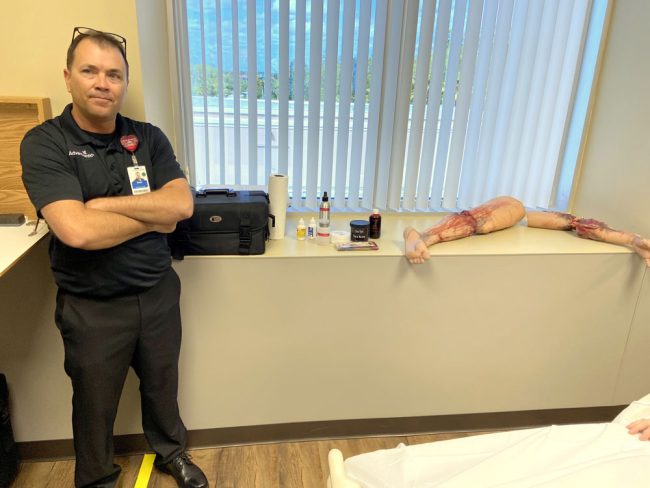
“Another sim I’ve done is a pediatric asthma scenario where the mannequin was a child and I was the mother, and the mannequin stops breathing,” Whaley said. “That was very intense – you’re freaking out that your child has stopped breathing. I’ve also played a patient with severe anxiety, and there was a domestic abuse component — so with makeup they gave me a blackeye, I’m scared, my husband is waiting for me outside. Very intense.”
“I will say the actors are really good at what they do,” McCurdy, the UNF student, said. “They’re always in character.”
Yes, the Regional Simulation Center, whose five labs make it the largest such facility among AdventHealth hospitals in Central Florida, has a staffer, Shannon Kelly, who’s in charge of auditioning and hiring actors for the program.
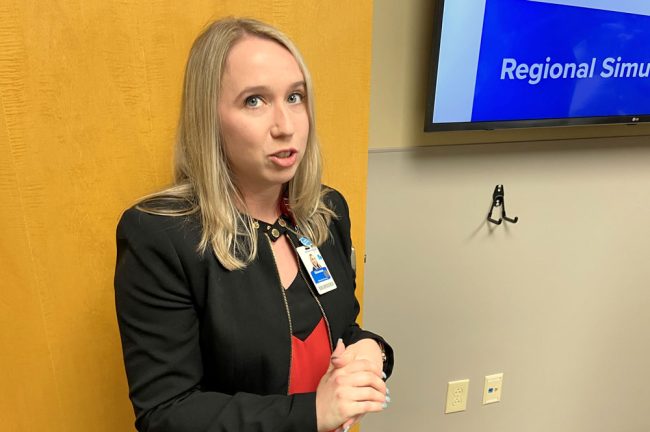
“We recruit our team from local theaters, and from throughout Central Florida, Tampa, the Orlando theater community, Disney, Universal,” said Kelly, whose official title is manager of the Standardized Patient Program. “A lot of them are professional actors but some of them are actually second career too. One of our SPs (standardized patients), Hood Roberts, was an attorney and judge for years and years, then he retired and said ‘Oh, I want to do some acting.’ So he joined our program and did some community theater as well too. He’s had strokes, motor vehicle accidents – he’s had it all.”
The sim center has an “SP educator” who “also has an acting background and a teaching background, and she works with the simulation learning strategists as well,” Kelly said. “They work together not only to make the scripts clinically make sense, but also to see they make sense of how a human would actually respond and react. Sometimes if you don’t have an acting background, you don’t understand how that scene is actually going to play out.
“We’re looking for more local actors for the Palm Coast sim lab to participate as SPs,” she added.
“They sent a flyer out with information about the job to local theaters,” Whaley said. “The Flagler Playhouse emailed it out to a bunch of us. I was like ‘That sounds fascinating! That sounds so cool. I would be so into that.’ ”
Whaley applied and was called in for an interview. Her audition consisted of the “nine out of 10” pain scenario.
“They gave us this one that’s a little more intense so they could see what we’re capable of,” she said.
She got the job in October, and traveled to sim centers at AdventHealth hospitals in Orlando, Daytona Beach and New Smyrna Beach. Now she works primarily in Palm Coast, “which is fantastic because I live very close,” Whaley said. She works two to three days a week, in shifts that vary from two hours to eight hours or longer.
And the pay?
“We’re paid pretty well — for an actor, yeah,” she said. “It’s a very cool job.”
It’s also a job in a market that’s growing.
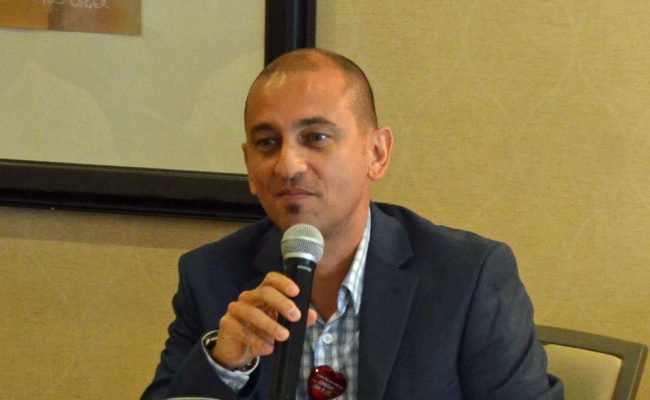
Wally De Aquino, chief operating officer for AdventHealth Palm Coast, said, “Our biggest challenge is capacity — we just opened and we’re getting very busy. It’s a regional simulation center. This sim lab is supporting six AdventHealth hospitals in our region. And we’re about to open a new hospital on Palm Coast Parkway. So this center is going to get very busy over the next few months to support the new staff for that hospital. Between the hospitals and the two universities we already have an agreement with, this is going to get very busy in the next year or so. The demand is there. So the capacity to support the organization is going to be very difficult.”
“I could never have imagined this,” Whaley said. “I had no idea that any hospitals were doing anything like this. The mannequins are very cool. They are very, very high tech. You can actually program them so if you are using a stethoscope, you can feel the breath and you can program it so it sounds like they have pneumonia. They can give IV medication to them.
“This is giving students a lot more practice before they are actually going into the hospital to do it. It’s a fantastic program. It’s very important lessons we are giving them.”
![]()
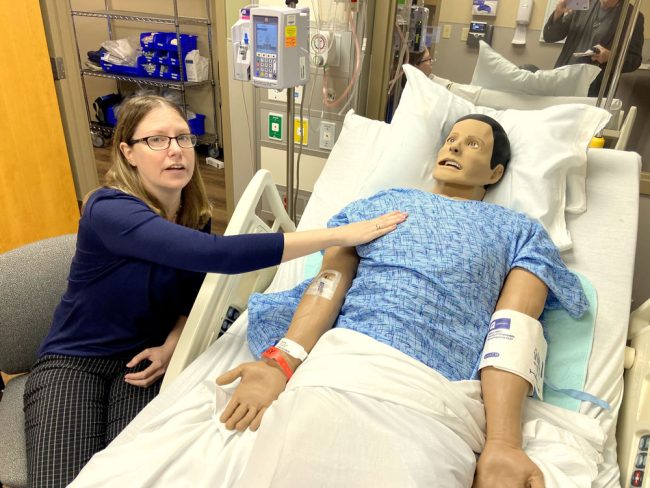





























Michael Van Buren says
While I appreciate the people helping train, and those attending, I have a bone to pick.
Now if they could only diagnose simple life threatening illnesses like cancer correctly. My father went there no less than 5 times over the last year of his life. History of cancer. No diagnosis until about a month before he passed. And only because we argued with the ER Dr to admit he because she said there was nothing wrong with him, “He was depressed” according to her. I avoid that hospital like the plague.
Char Cunha says
This is fantastic to see happening!
A great contribution to those students plus adding jobs!
Love it!